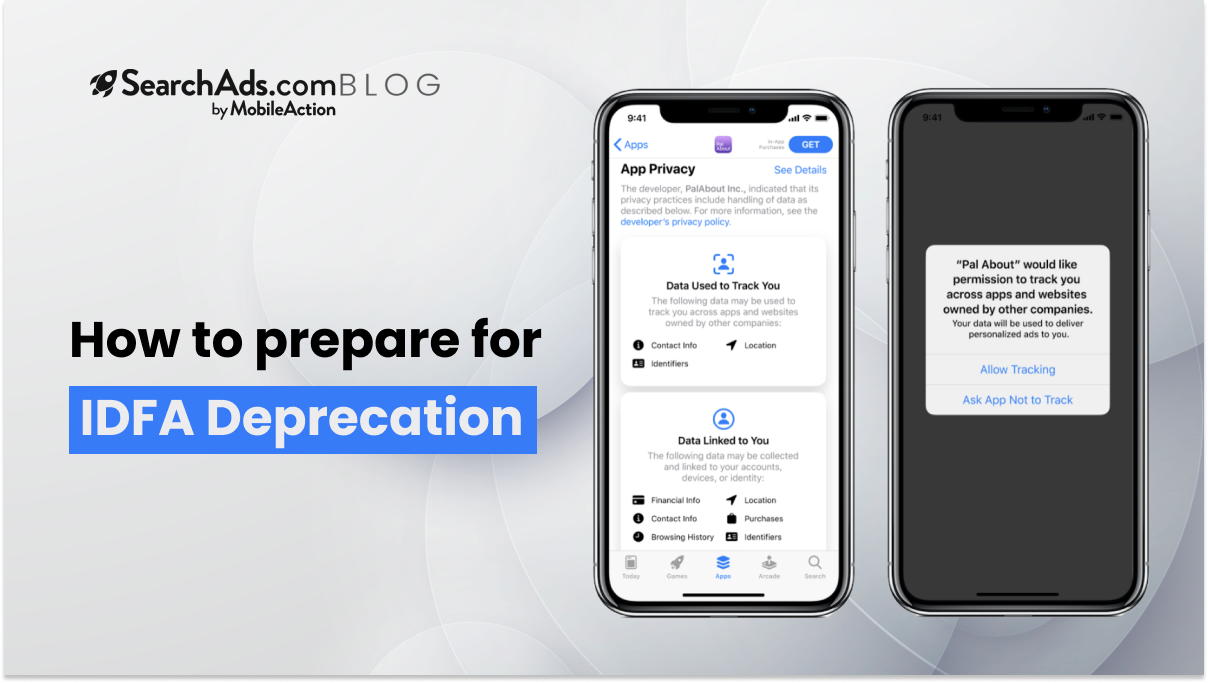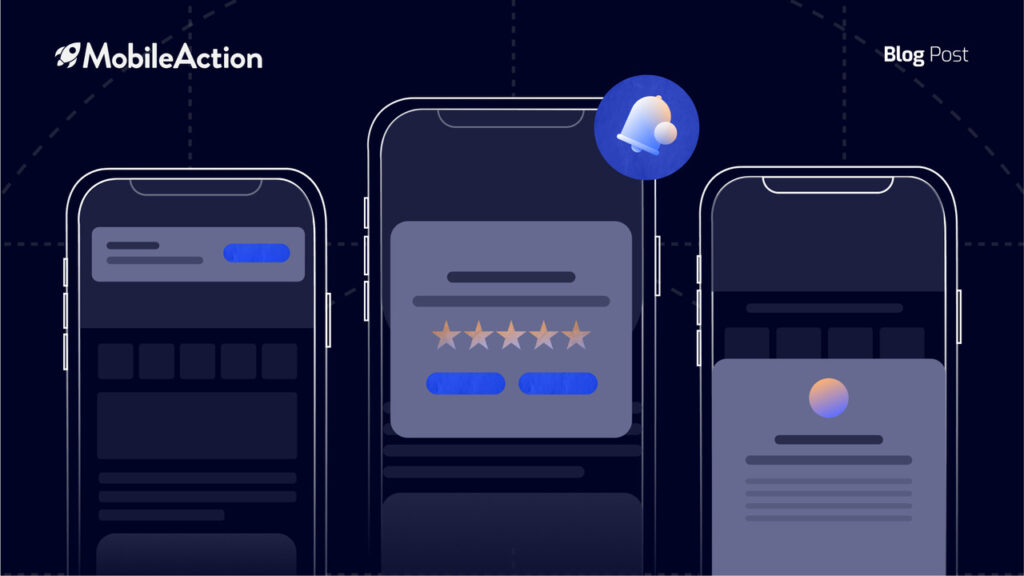How can we prepare for IDFA Deprecation? App developers have been worried about all the buzz surrounding the new privacy policy being implemented by Apple.
You can check out our panel on IDFA changes, what to expect, and how to prepare. This panel features Amit Peled, User Acquisition Manager at Playtika, Ofir Pasternak, Founder & CEO at Persona.ly, Thomas Petit – Independent App Growth Consultant, and Yusuf Barutcu, Apple Search Ads Advisor at SearchAds.com.
These experts discuss how app marketers need to get prepared for IDFA Deprecation and their take on the future outlook of the mobile industry without the IDFA.
In order to prepare for this change there are three things you need to focus on:
- Get informed on IDFA
- How The Apple Search Ads will affect/be affected by this and the opportunities it will provide concerning ASO
- What some early strategies are of people bracing themselves for these changes
Get informed on IDFA
App developers have been worried about all the buzz surrounding the new privacy policy being implemented by Apple. In order to prepare properly, we must first understand all the implications surrounding IDFA depreciation. We have discussed how to handle this IDFA deprecation in a previous post: IDFA Changes Coming Up in 2021: What to expect? How to prepare?. This post should also help you with your preparation for this event.
What is IDFA?
What is the IDFA? It is the Identifier for Advertisers. It allows any app a user installs, to track user behavior. This encompasses other companies’ apps, websites, or offline properties. This is all done to aid in ad personalizing and user experience. You may know the use of a similar tracking system that many websites use, as cookies.
This mobile version of cookies (IDFA) enables advertisers to track a user’s interactions within mobile apps, such as downloads, clicks, and purchases. The IDFA does not have the ability to retrieve any personally identifying information. Instead, it tracks in-app activity and downloads.
What will change
Users have always had the ability to decline being tracked. However, the difference is in the way the option will be presented. Whereas previously, users could go into their settings and opt-out of being tracked, now they must opt-in.
Though this may not seem like a large distinction, it is. The change in the way this is presented will decrease the number of users who opt-in to tracking to below 20 percent.
As a Mobile Marketer, you surely have a lot of questions. information about SKAdNetwork is under more demand than ever before. This is Apple’s framework for attribution. It is of clear advantage to you to understand this and how it will work. It is also to your advantage to understand what MMPs will do to adapt to this new landscape.
Experts on the subject have hypothesized that after the change, IDFAs will drop to around 20 percent, possibly lower. This will mean that those who usually rely on profiles of specific devices will have to find workarounds.
Some apps may take the approach of asking more regularly for consent to track data. This could raise the percentage. However, it will become necessary to come up with at least a hybrid approach. It is possible that the market may shift to a place where those apps which can convince users to opt-in, will get more money from advertising than those who cannot.
List of effects
- Targeting: Advertisers will no longer be able to identify an individual unless they opt-in. If they opt in to be tracked then they will be able to be tracked by the application where the ads are running.
- Pacing: Advertisers will not get the information indicating the users’ interest and will therefore not be able to put an informed and accurate cap on messages delivered to individuals. This may result in wasted funds on users who are not responsive to particular messaging.
- Measurement: Clicks, downloads, and other in-app events like registrations and purchases will become unavailable to users who have not opted-in to tracking. Therefore conversion tracking will be harder to achieve on iOS.
- Personalization: A/B testing and the subsequent personalization of creatives will become limited. This will mean that you will either have to use more generalized creatives. Alternatively, you will have to show many different versions of creatives to the same people which will be less cost-effective.
- Fewer choices for advertisers: Advertisers may be inclined to put more of their advertising resources into places with more accurate and precise data on their users. If your campaigns become less fruitful with this change you may turn to applications where logins are required and cross-device data collection is more available.
How this will tie in to Apple Search Ads
Apple Search Ads will not be subject to this new IDFA restriction. This means that the Apple Search Ads Network may become more popular after this restriction is put in place.
Users can still manually opt out of Apple Search Ads tracking on their device but will otherwise have their IDFA information collected as per usual. As a result, good ASO will become more crucial than ever to apps in the App Store.
A well-structured ASO strategy can increase relevance in the App Store, and Apple Search Ads ads are shown to those who have the highest bid and the most relevancy. Therefore it is prudent to combine ASO and Apple Search Ads efforts
You can also target specific keywords you are actively using or intend on using in your metadata. This will show you the conversion rates for words that you might want to rank for organically in the future.
How to measure and optimize UA efforts post IDFA
If you are an app that already has historical data collected on your user base, you can create your own unique measurement model. Now is the time to collect, organize, and save data. Make prediction formulas and see if they work, start building a prediction plan now. This will be a sort of predictive analysis that you will have to do in order to accurately predict user behavior. You must do a deep dive into the data you already have. Extrapolate trends and predictions, and then relate them to the returns that you get in the long run.
You will also have a small portion of people who do opt into the data tracking option. These may or may not be representative of your user base on a large scale. You should keep a close eye on whether or not your much larger user-base who has not opted in is behaving similarly to those who opt in or not.
It is also possible that some users may be annoyed with the creatives they are being delivered when they have opted out of tracking. There may be a slight increase in opt-ins after a few months of the new system.
How to mitigate the issues that IDFA depreciation has brought upon us
The time for having 500 iterations of the same creative is over. Now might be the time to have 4 or five very different creatives. This way you can judge which ones are bringing you more success with the much smaller pool of data. From there you can split this into two iterations and so on.
You can also continue to divide between devices. Use contextual targeting, and analyze apps that are very similar to your app. These similar apps should not only be competitors for this to be useful but also very similar in function and content.
Possible strategies for game apps
More games might ask for sign up immediately on downloading the game. This could be a way to get more data on their users. They also might be more ready to include features like in-app messaging.
Keep up with everything
You should stay posted on exactly what is going on. Keep up with what strategies other apps are using to keep up with the changes in the app store. Though it may take some time to adjust to this new world of advertising, remember that everyone is facing this same issue. It is important to keep up with solutions that people are coming up with to work around this new legislation. Sign up for SearchAds.com to stay updated on everything concerning IDFA depreciation. Remember that you can use SearchAds.com to make your Apple Search Ads more efficient.
The IDFA changes will take place on Monday, April 26th as announced by Apple. Stay tuned.




